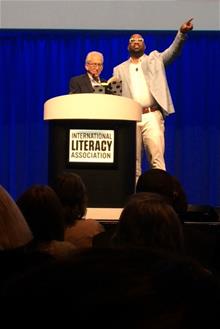 When Closing General Session wrapped up at the ILA 2016 Conference & Exhibits in Boston on Monday, the energy was as high as it had been when attendees first walked through the doors of the John B. Hynes Veterans Memorial Convention Center for Opening General Session.
When Closing General Session wrapped up at the ILA 2016 Conference & Exhibits in Boston on Monday, the energy was as high as it had been when attendees first walked through the doors of the John B. Hynes Veterans Memorial Convention Center for Opening General Session.
At the opening Saturday, it became clear that this year’s conference was going to be addressing the very real issues that are unfolding around the world before everyone’s eyes. The conference theme, Transforming Lives Through Literacy 2.0, is not only about embracing a digital world, but also using literacy to open dialogues about what separates students in their communities and helping to inform social, emotional, and political literacy.
Diane Barone, outgoing ILA Board President, opened the session discussing the roles of educators in the coming months to talk with children about tragedies going on around the world, from Minnesota to Bangladesh.
Adora Svitak, an author who gave a TED Talk at age 12 about what teachers can learn from their students that has garnered 4.3 million views, asked “What is literacy for?”
“Literature sparks conversations about feelings,” she said. “How can we set the stage for emotional literacy if the stories we encounter teach us the lessons that only certain people are worthy?”
She said there is a “systemic failure to implement empathy in tandem with literacy. Literacy and love must always go together…. So I ask again: What is literacy for? All of this, and all of us.”
Dynamic author Kwame Alexander took the stage next and shared passages from his books in the context of social equality.
“Books do not discriminate, words do not segregate,” he said. He recalled a story about a question he got during a signing of his picture book Surf’s Up.
“'I have kids in my library,'” a librarian said. “'I have to know—what color are the frogs?'”
He continued. “I said, ‘The question is much more interesting than any answer I could give you.’
“If we decide what books girls read, boys read, we'll end up with the adults that we despise.”
The theme of literacy as a tool of equality continued throughout the conference via sessions, author talks, and attendee discussions through the long weekend.
When ILA 30 Under 30 honoree Ana Dodson took the stage Monday afternoon for Closing General Session, she shared her experiences bringing education to young women in Peru.
A native of the country who was adopted by an American family, Dodson visited her homeland and saw the effect of illiteracy and inaccessibility of education.
To bring the point home, she shared a video of a Peruvian Hearts scholar, a girl named Jessica whose sister was a former Hearts scholar. Jessica had taken a college entrance exam four times before getting a spot at the university, but wasn’t going to be able to afford transportation, tuition, or supplies. In the video, Jessica was given a box inside of which was an application to apply for the program’s scholarship. When she processed what she was looking at—within seconds—Jessica and her entire family broke into sobs. Tears also fell in the auditorium.
After Dodson’s captivating story, Steven Duggan, Director of Worldwide Education Strategy for Microsoft Corporation, came to the stage to share how educators and non-profits can make a difference in their classrooms and around the world through failure.
He used the example of Chekhov, the app Microsoft developed to take books to developing countries where children may not have a literate person in their home.
“Giving a child a book when there is not a literate parent or peer in their home is as good as giving them a rock,” he said. So in trying to solve the international illiteracy problem, they looked to mobile technology for help.
“We thought, what if literacy was an epidemic for which the vaccine was already in their back pocket?” he asked. Microsoft worked on a mobile app where books could be created, downloaded, and read or have it read to children. After $500,000 spent on development and training, the app failed. Not a single book was created.
Adjustments were made through the failure and Chekhov is now the most popular app available in their app store.
He said failure is frightening, but necessary.
In the final address of Conference, The New York Times best-selling author Laurie Halse Anderson addressed a similar issue of fear in the context of ending injustice through education.
“Literacy is our super power!,” she yelled. “We deserve capes!”
She talked about the cycle of the hero, how a problem is identified, a potential hero is approached, and the struggle that ensues as “the hero stands in the threshold” before coming to the rescue.
She spoke about institutional racism, American history, and what has to happen to finally bring equality to all people.
“Our nation is standing on a threshold,” she said. “Children around the world are looking for heroes. They are looking for you.
“When we walk out those doors in a moment, we will cross the threshold. Please join me in the greatest revolution the world has ever known—a revolution that is based on love.”
April Hall is editor of Literacy Daily. A journalist for 20 years, she has specialized in education, writing and editing for newspapers, websites, and magazines.